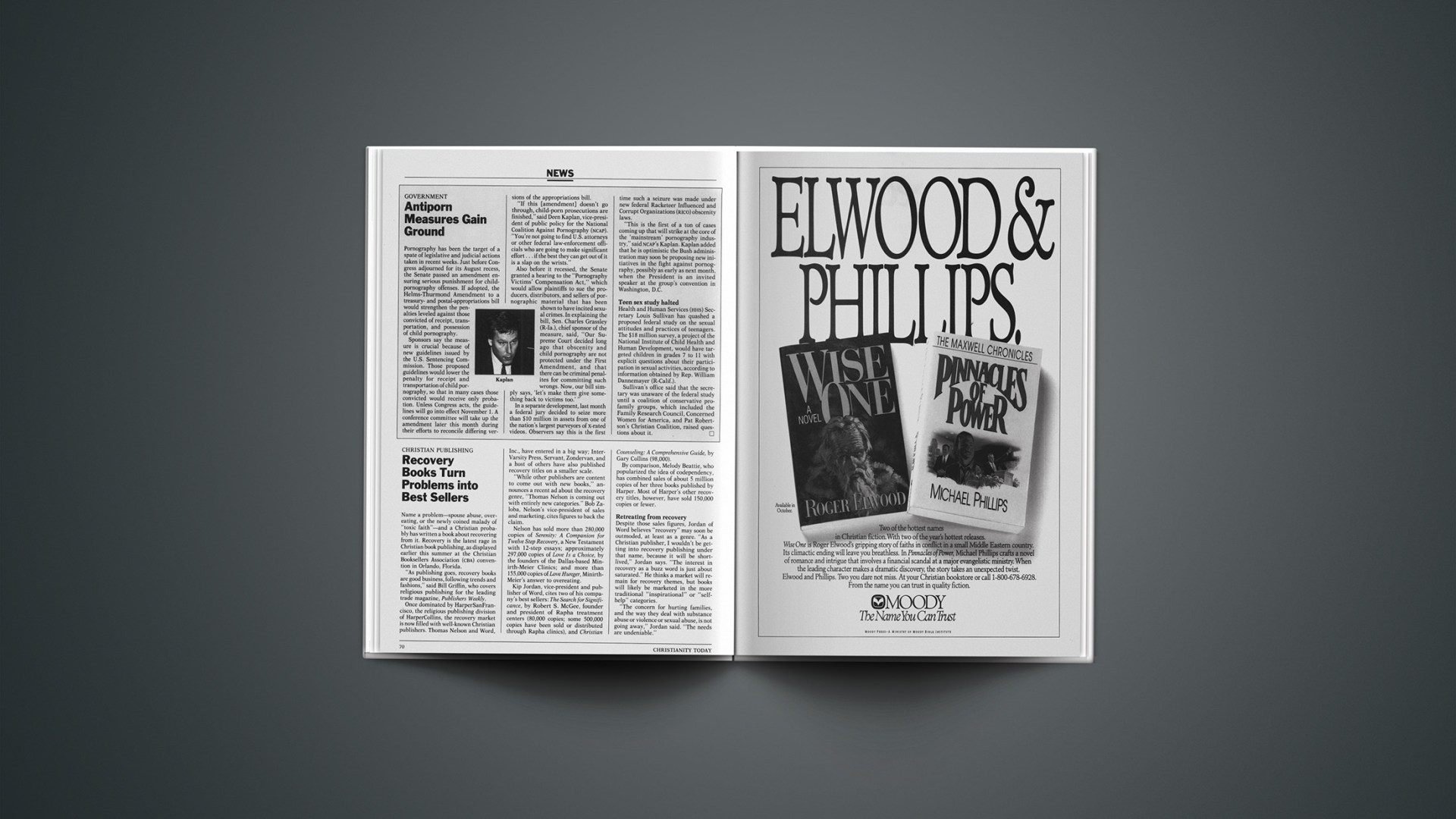Name a problem—spouse abuse, overeating, or the newly coined malady of “toxic faith”—and a Christian probably has written a book about recovering from it. Recovery is the latest rage in Christian book publishing, as displayed earlier this summer at the Christian Booksellers Association (CBA) convention in Orlando, Florida.
“As publishing goes, recovery books are good business, following trends and fashions,” said Bill Griffin, who covers religious publishing for the leading trade magazine, Publishers Weekly.
Once dominated by HarperSanFrancisco, the religious publishing division of HarperCollins, the recovery market is now filled with well-known Christian publishers. Thomas Nelson and Word, Inc., have entered in a big way; InterVarsity Press, Servant, Zondervan, and a host of others have also published recovery titles on a smaller scale.
“While other publishers are content to come out with new books,” announces a recent ad about the recovery genre, “Thomas Nelson is coming out with entirely new categories.” Bob Zaloba, Nelson’s vice-president of sales and marketing, cites figures to back the claim.
Nelson has sold more than 280,000 copies of Serenity: A Companion for Twelve Step Recovery, a New Testament with 12-step essays; approximately 297,000 copies of Love Is a Choice, by the founders of the Dallas-based Minirth-Meier Clinics; and more than 155,000 copies of Love Hunger, Minirth-Meier’s answer to overeating.
Kip Jordan, vice-president and publisher of Word, cites two of his company’s best sellers: The Search for Significance, by Robert S. McGee, founder and president of Rapha treatment centers (80,000 copies; some 500,000 copies have been sold or distributed through Rapha clinics), and Christian Counseling: A Comprehensive Guide, by Gary Collins (98,000).
By comparison, Melody Beattie, who popularized the idea of codependency, has combined sales of about 5 million copies of her three books published by Harper. Most of Harper’s other recovery titles, however, have sold 150,000 copies or fewer.
Retreating From Recovery
Despite those sales figures, Jordan of Word believes “recovery” may soon be outmoded, at least as a genre. “As a Christian publisher, I wouldn’t be getting into recovery publishing under that name, because it will be short-lived,” Jordan says. “The interest in recovery as a buzz word is just about saturated.” He thinks a market will remain for recovery themes, but books will likely be marketed in the more traditional “inspirational” or “self-help” categories.
“The concern for hurting families, and the way they deal with substance abuse or violence or sexual abuse, is not going away,” Jordan said. “The needs are undeniable.”
Some Christian bookstores were initially skeptical of the recovery line. “When the codependency books first hit the market, some folks were unsure of what these books entailed,” says CBA president Bill Anderson. Many Christian bookstores “have to jump through an extra hoop” of checking theology before Selling them, he says.
Since clearing that extra hoop, such recovery titles as Love Hunger, Love Is a Choice, and Love Is a Decision have landed regularly on CBA’S list of the 20 top-selling Christian books. And some recovery books by Christians have found good markets in secular, and even New Age bookstores. Zaloba says up to 40 percent of Nelson’s recovery sales are in secular stores.
“I think this is a subject that has a chance of crossover in the right direction,” Anderson says about Christian recovery titles selling in secular markets. “Declaring unabashedly who God is, and who Christ is, is a tremendous opportunity.”
Toxic Faith (published by Oliver Nelson) is one Christian recovery title doing well in secular stores. In its first month of publication, the book placed in the top 100 hardcover nonfiction titles in the B. Dalton Booksellers chain, reports coauthor Stephen Arterburn. Toxic Faith examines “religious addiction” through the lens of evangelical Christianity, a faith the recovery movement frequently portrays as the problem rather than the solution.
Arterburn believes the recovery movement will leave a strong legacy. Some people are ostracized if they talk about their problems at church, he says. “If you go to an Alcoholics Anonymous meeting and act like you don’t have a problem, you’ll be ostracized and asked to leave. In many ways I think the AA meeting is closer to what Christ would have us be.”
Though some see recovery as little more than the latest publishing fad, Arterburn sees lasting value. “Recovery books are real,” he says. “If they are written by people who know what they’re talking about, they can become classics and stand the test of time.”
By Doug LeBlanc.









